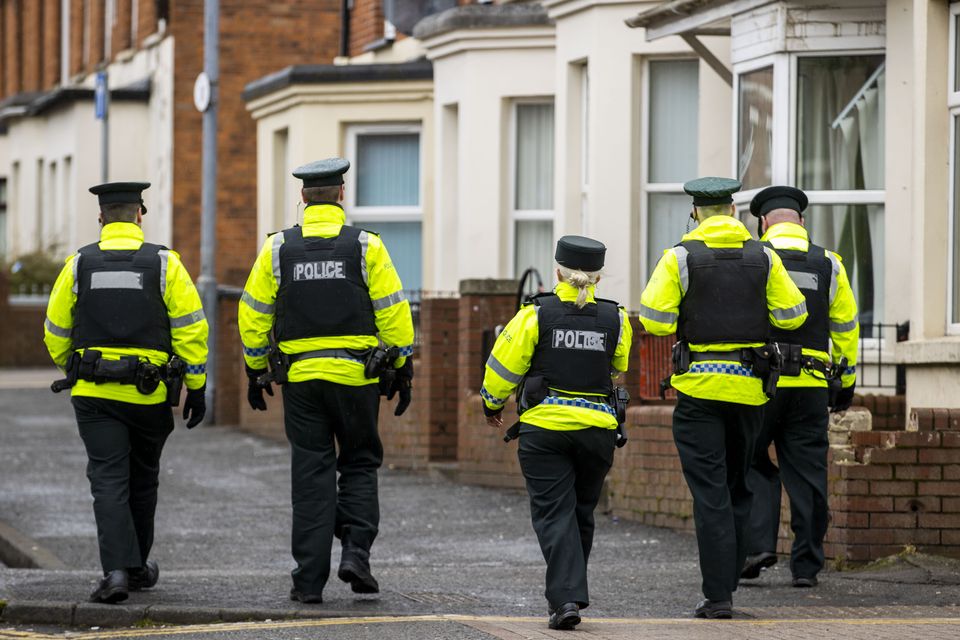Budget pressures have meant the average time it takes police in Northern Ireland to respond to non-emergency calls has increased from two minutes to nine, MPs have been told.
Pamela McCreedy, chief operating officer at the Police Service of Northern Ireland (PSNI), told the Northern Ireland Affairs Committee the “significant deterioration” means some people attempting to contact police via 111 simply abandon their call or instead phone 999.
She spoke about the diminished capacity of the force, pointing out that officers in murder investigation teams are dealing with workloads in excess of 20 cases – compared with a national recommendation of six.
She also told the MPs of concerns about police vehicles being taken out of action for hours while parked at hospital emergency departments dealing with cases involving vulnerable people.
The committee was holding an evidence session as part of its inquiry into the funding and delivery of public services in Northern Ireland.
The PSNI leadership has long raised concern over budget pressures leading to reduced officer numbers and service capacity.
Pamela McCreedy told MPs that the PSNI is attempting to raise its officer numbers over the next three years (Liam McBurney/PA)
Providing an update to MPs, Ms McCreedy said the PSNI has become an “an emergency service of first and last resort at the moment”.
The PSNI was created in 2001 following a report by Chris Patten which said the force should have 7,500 officers for peacetime policing.
Ms McCreedy told the committee: “Since 2010 our budget has been standstill at best, with inflation that is actually a 36% reduction.
“The recommendation coming out of Patten is that we would have in the region of 7,500 officers and 3,000 police staff.
“We are sitting at below 6,300 officers at the moment and just over 2,200 staff.
“That is a significant problem. Our ability to respond to our communities, which is for Northern Ireland what community policing and neighbourhood policing is about, we have a 300 reduction in our neighbourhood policing teams, we are having to merge teams.
“We have had a drop in availability of officers to our tactical support teams, our public order.
“This resulted in the summer in us requiring mutual aid from our colleagues in Scotland to be able to deal with that.”
She added: “Our murder inquiry teams, our MIT (major investigation teams), are dealing with caseloads in excess of 20.
“The national recommendation is to hold six.
“That slows down the ability for us to get justice, perpetrators at large and so forth.
“We are absolutely seeing we are having an impact on our workforce – in many ways we are breaking our workforce.”
Ms McCreedy said the PSNI is seeking to recover officer numbers over the next three years.
“We need to get back to those figures. If we had held pace with investment into policing in England and Wales we would be sitting at 8,000-8,500 (officers) now,” she said.
“Our ability to get there is really challenging.
“We are proposing to increase our recruitment over the next three years at a reasonable pace. We are about to launch our new recruitment campaign.
“We do anticipate the business case over the next five years, fully costed, that would require an additional £200 million into PSNI to get our headcount, our officer level, at a place we can actually respond to the needs of the population.”
DUP MP Gavin Robinson asked what services are under threat due to budget pressures.
Ms McCreedy replied: “There were a small number of areas we did stop – station inquiry offices, we closed a number where there was low footfall.
“But it is a diminishment to the service and it means our communities and victims… we will not be able to respond in the same way.
“Our 999 response, we are absolutely holding on to our performance, but with the reduction in headcount our 101 responses are starting to slow down.
“We were doing two minutes 12 seconds in response, that is now nine minutes.
“It is a significant deterioration, and then calls are abandoned or they become a 999 call and then we have to start looking at how we prioritise that.”
She added: “Fully recognising the pressures on our health service… We have seen ambulances lined up at EDs (emergency departments), which is not acceptable, but there was a full line of police cars sitting at a local ED last week as well.
“When we looked at a four-week period of that, for police officers assisting people who would require a mental health assessment, they are there for 14 hours, that is the average.
“That is just not sustainable for us.”
